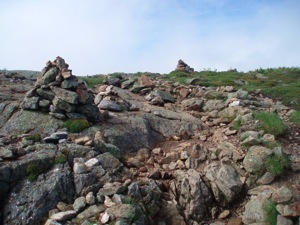July 2, 2009


By Marty Basch
Mountains, lakes and streams know no age. From a 17-year-old Eagle Scout who survived a three-day White Mountain ordeal to a missing 70-year-old Canadian who spent his whole life fishing and hunting, each search and rescue operation is a chance to learn from the mistakes of others.
Though it might seem like spring and summer merge together as search and rescue season in these parts, it is a year-round exercise that touches hikers, anglers, hunters, snowmobilers, backcountry skiers and snowboarders, paddlers and mountain bikers.
Missing hikers get the most attention. There are more of them.
And each mistake provides a learning opportunity for those about to venture into the outdoors.
Mount Washington
The Eagle Scout, though praised by authorities for doing many right things during his April mishap in the snows of Mount Washington, was still just a teen-ager who decided to hike alone in snowy conditions. Clearly Scott Mason's training paid off and saved his life. It also provides a few more tips for what to do when lost in the mountains.
He was able to start fires with hand sanitizer gel. The gel burns on what it is sprayed on and used it on snow.
He also knew to build himself a shelter for wind protection at night. Mason was carrying a bivvy sack - a small sleeping bag shell - for his ambitious 18-mile day-long hike and managed to sleep one night in a crevice. Mason used rocks to further protect himself from the wind.
Evans Notch
In May, two 21-year-old Maine women set out for a 10-mile long day hike in Evans Notch along the sometimes rugged Baldface Circle Trail. The two were apparently inexperienced and didn't tell anyone their intended hike, only that they were going hiking in the White Mountains before returning home for a volleyball game. It was only after one of their parent's checked their daughter's computer that they saw plans for hiking Baldface Mountain.
The two young women started out on their 10-mile hike at 2 p.m., much too late for a Baldface hike by unsophisticated hikers. Averaging two miles per hour, that would have put them in at around 7 p.m. in the waning sunlight.
It was also discovered the two set out with no trail map or overnight gear, and became lost when they missed a turn at a trail junction. Their cell phones had no coverage in the notch.
Happenstance intervened and they met a fellow hiker, Drew Inzer, a former Kennett High School football coach and member of both the New England Patriots and Jacksonville Jaguars, who walked them out to safety the next day.
Mount Washington, again
In June searchers scoured Mount Washington for a missing 70-year-old Ontario man who was hiking alone. Though he had frequent contact with a sister back home, the man only indicated he was climbing Mount Washington. Searchers found his vehicle in Pinkham Notch and recovered a journal which only indicated he was going for a day hike up Mount Washington, but didn't record any other information about his intended route.
Ill-equipped hikers, no matter their experience, put others at risk. The lion's share of search and rescue personnel are volunteers. They risk their lives to save those missing in the mountains. When a family at home reports their loved one is missing, the volunteers leave their loved ones at home to venture into the mountains.
Ill-equipped hikers also drain budgets and other resources. People slip and fall in the woods. Broken bones and heart attacks happen everywhere.
Hike safe
Those heading into the outdoors can take simple steps to save themselves and prevent others from having to help them. The 10 basic items, recommended by New Hampshire Fish and Game and the U.S. Forest Service at hikesafe.com, hikers should carry are:
-
1.map
-
2.compass
-
3.warm clothing
-
4.extra food and water
-
5. flashlight
-
6. matches
-
7. first aid/repair kit
-
8.whistle
-
9. rain/wind clothing
-
10. pocket knife
Those essentials apply to all who head into the outdoors. And tell someone your route, even if you jot it down at the last minute and leave it in your vehicle. You don't have to be an Eagle Scout to be prepared.


Copyright 2009 Marty Basch
Copyright 2009 Marty Basch


